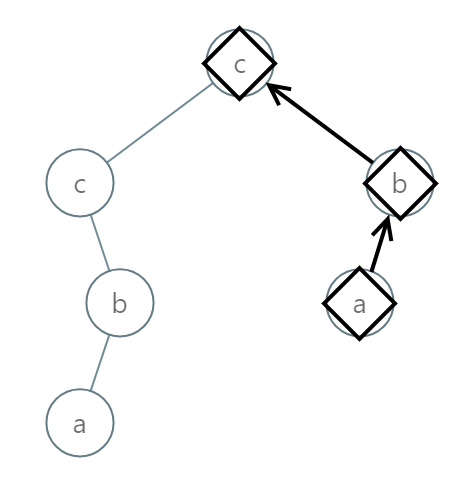Welcome to Subscribe On Youtube
988. Smallest String Starting From Leaf
Description
You are given the root of a binary tree where each node has a value in the range [0, 25] representing the letters 'a' to 'z'.
Return the lexicographically smallest string that starts at a leaf of this tree and ends at the root.
As a reminder, any shorter prefix of a string is lexicographically smaller.
- For example,
"ab"is lexicographically smaller than"aba".
A leaf of a node is a node that has no children.
Example 1:

Input: root = [0,1,2,3,4,3,4] Output: "dba"
Example 2:

Input: root = [25,1,3,1,3,0,2] Output: "adz"
Example 3:

Input: root = [2,2,1,null,1,0,null,0] Output: "abc"
Constraints:
- The number of nodes in the tree is in the range
[1, 8500]. 0 <= Node.val <= 25
Solutions
-
/** * Definition for a binary tree node. * public class TreeNode { * int val; * TreeNode left; * TreeNode right; * TreeNode() {} * TreeNode(int val) { this.val = val; } * TreeNode(int val, TreeNode left, TreeNode right) { * this.val = val; * this.left = left; * this.right = right; * } * } */ class Solution { private StringBuilder path; private String ans; public String smallestFromLeaf(TreeNode root) { path = new StringBuilder(); ans = String.valueOf((char) ('z' + 1)); dfs(root, path); return ans; } private void dfs(TreeNode root, StringBuilder path) { if (root != null) { path.append((char) ('a' + root.val)); if (root.left == null && root.right == null) { String t = path.reverse().toString(); if (t.compareTo(ans) < 0) { ans = t; } path.reverse(); } dfs(root.left, path); dfs(root.right, path); path.deleteCharAt(path.length() - 1); } } } -
/** * Definition for a binary tree node. * struct TreeNode { * int val; * TreeNode *left; * TreeNode *right; * TreeNode() : val(0), left(nullptr), right(nullptr) {} * TreeNode(int x) : val(x), left(nullptr), right(nullptr) {} * TreeNode(int x, TreeNode *left, TreeNode *right) : val(x), left(left), right(right) {} * }; */ class Solution { public: string ans = ""; string smallestFromLeaf(TreeNode* root) { string path = ""; dfs(root, path); return ans; } void dfs(TreeNode* root, string& path) { if (!root) return; path += 'a' + root->val; if (!root->left && !root->right) { string t = path; reverse(t.begin(), t.end()); if (ans == "" || t < ans) ans = t; } dfs(root->left, path); dfs(root->right, path); path.pop_back(); } }; -
# Definition for a binary tree node. # class TreeNode: # def __init__(self, val=0, left=None, right=None): # self.val = val # self.left = left # self.right = right class Solution: def smallestFromLeaf(self, root: TreeNode) -> str: ans = chr(ord('z') + 1) def dfs(root, path): nonlocal ans if root: path.append(chr(ord('a') + root.val)) if root.left is None and root.right is None: ans = min(ans, ''.join(reversed(path))) dfs(root.left, path) dfs(root.right, path) path.pop() dfs(root, []) return ans -
/** * Definition for a binary tree node. * type TreeNode struct { * Val int * Left *TreeNode * Right *TreeNode * } */ func smallestFromLeaf(root *TreeNode) string { ans := "" var dfs func(root *TreeNode, path string) dfs = func(root *TreeNode, path string) { if root == nil { return } path = string('a'+root.Val) + path if root.Left == nil && root.Right == nil { if ans == "" || path < ans { ans = path } return } dfs(root.Left, path) dfs(root.Right, path) } dfs(root, "") return ans }